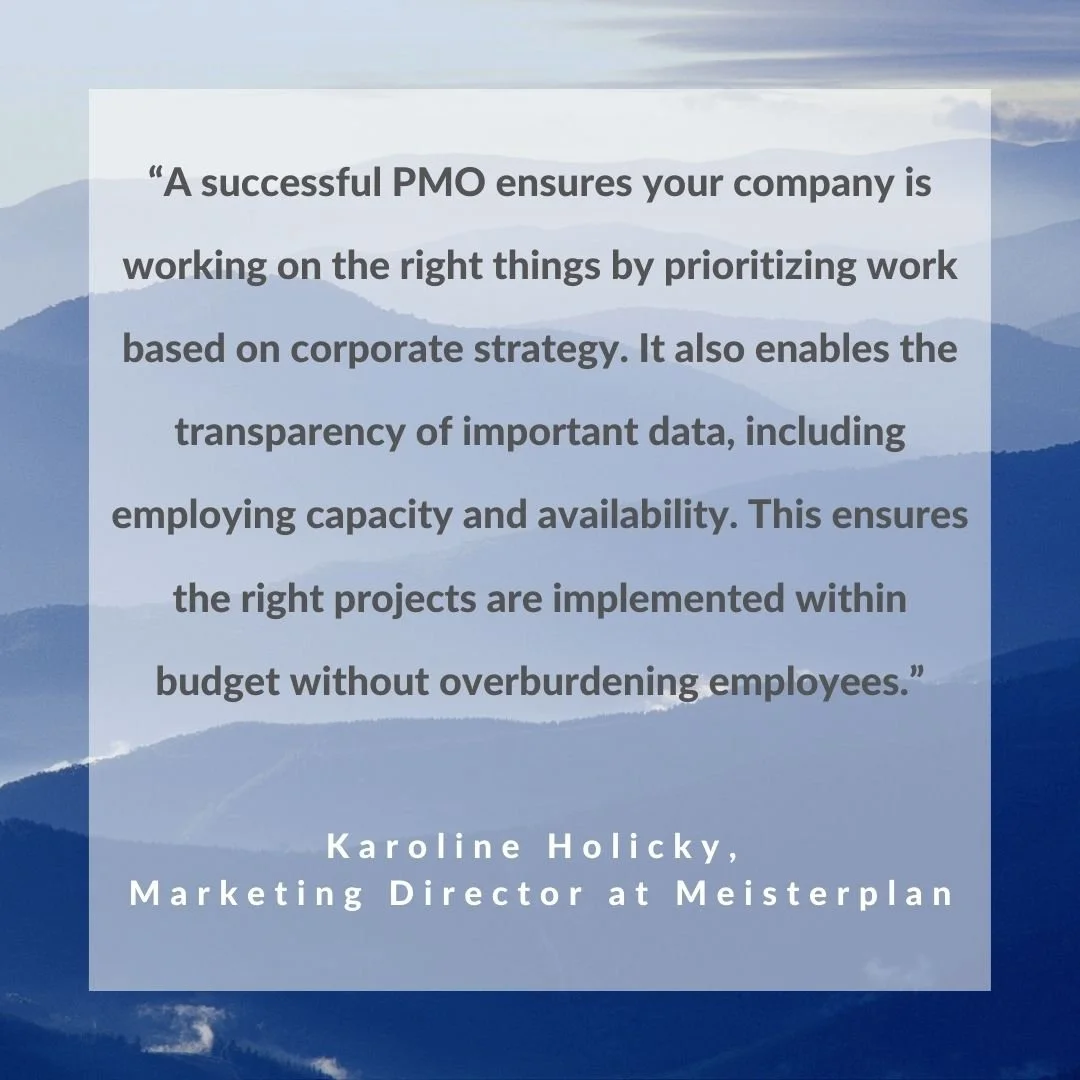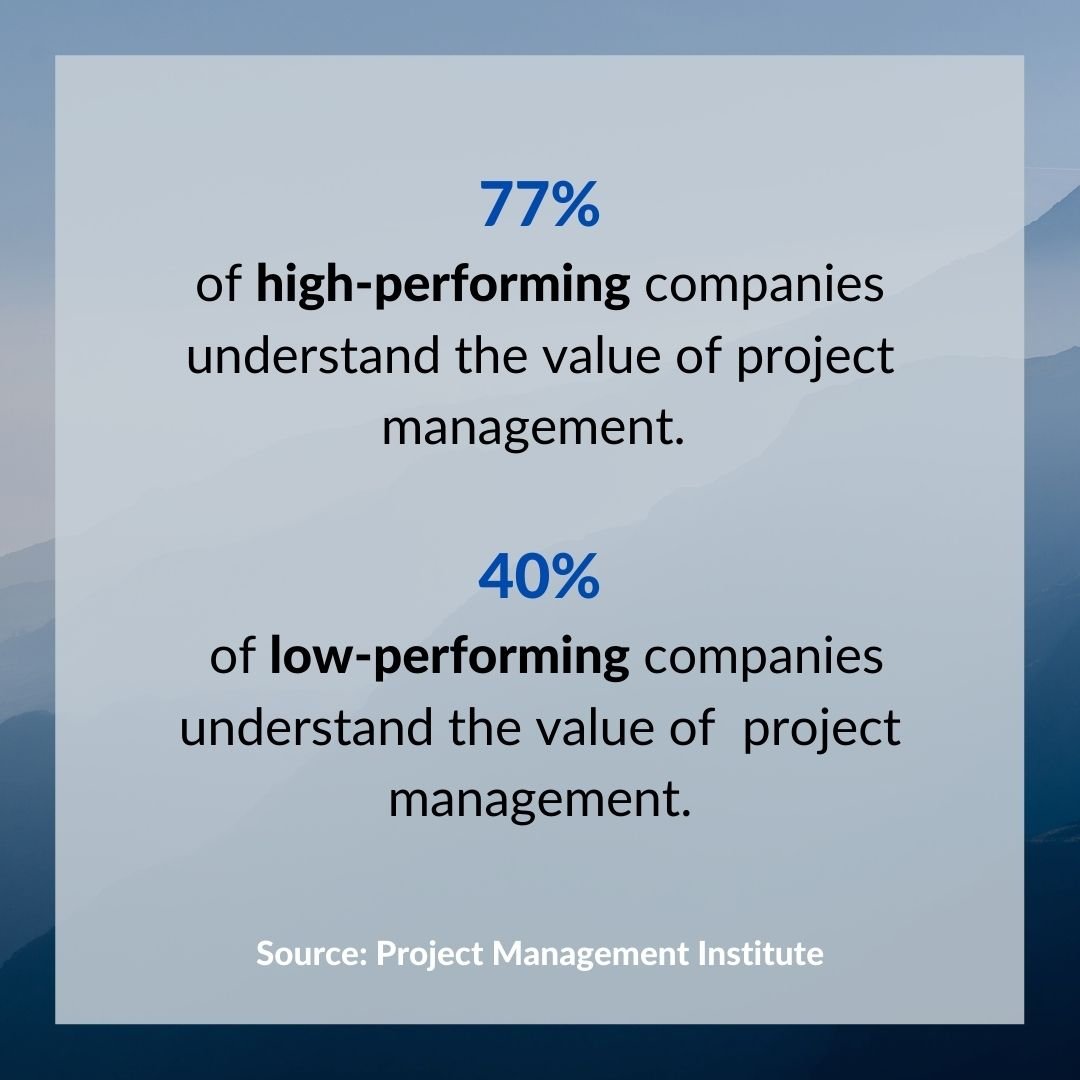Why You Need a Marketing PMO
Marketing is a complex, multi-faceted, and detailed-oriented discipline. In fact, we often say, “Marketing is a process, not an event.”
However, some of the most common issues we see in start-ups and scaling organizations stems from low prioritization of proper project management.
Lack of project management leads to failed programs, bloated budgets, burnout, and diminishing returns in marketing investments.
But let’s back up for a second…
Organizations hire for a purpose, right? Companies hire marketing SMEs to deliver on individual marketing goals. However, these same marketing experts are oftentimes also expected to uphold project management pieces/skills when they’re not specifically trained in those areas or have access to the right tools in order to execute. These experts end up siloed, solely working within their own discipline leading to chaos, disconnected programs, and missed opportunity. Strong, centralized project management is needed to connect the dots across all disciplines and drive seamless programs.
While project management and marketing skills seem like they go hand in hand, in faster-paced working environments, the first thing that tends to give when it gets busy is intentional alignment and connected delivery. Project management is the foundation of a healthy organizational culture and supports teams in working together towards a unified goal.
A key to the successful execution of your marketing strategy
One of the most critical pieces to bringing your marketing strategy to life is none other than a marketing PMO (project management office). You may or may not be familiar with the term, but according to Meisterplan, “A successful PMO ensures your company is working on the right things by prioritizing work based on corporate strategy. It also enables the transparency of important data, including employing capacity and availability. This ensures the right projects are implemented within budget without overburdening employees.”
Proper project management within an organization can eliminate the most common headaches for both employers and employees and foster an environment in which people thrive, customers are happy, and teams are ready for anything.
But before we dive in on the specifics of why you need a marketing PMO, it’s critical to understand what the PMO is and how it should function in your marketing organization.
What is a PMO?
In more technical terms, a PMO is “a group or department within a company that defines and maintains standards for project management within the organization.” - TechTarget
A successful marketing PMO is responsible for upholding the defined marketing strategy and upholding a clear and concise portfolio of work to ensure the success of all projects. Not only that, the beauty of project management is that it is a dynamic practice that adapts to the industry and working environment you are in, so no matter what your organization type, a marketing PMO is a critical role within your marketing strategy.
When determining the value of a PMO within an organization, the Project Management Institute or “PMI” provides a holistic perspective towards the way project management and your PMO should be viewed:
“Project management is the use of specific knowledge, skills, tools, and techniques to deliver something of value to people.”
The goal of the marketing PMO is always to bring value to the end-user, whoever that may be, and with that intention at the core, should base your marketing organization's PMO.
Why a marketing PMO is critical to the success of your marketing efforts
Let’s walk through a common scenario for this:
You have great marketing ideas, a solid team and good intentions… however, every campaign, every project and every launch leaves you feeling like you’re barely hanging on. You’re burnt out and feeling like something is missing or that you and the team could’ve executed way better.
Why can't you get this whole thing to work?
In marketing, no matter the organization type or size, you are most likely working with multiple different projects across multiple departments all at once for these campaigns. As you continue to scale and grow the organization, chances are things are bound to get messy.
According to an article by Villanova university, “Few companies can fulfill sales and profit goals, efficiency and productivity objectives, and shareholder expectations without skilled project managers.”
The benefits of having a PMO are often categorized as “invaluable” in the sense that there is accountability within your project, campaign, and organization to identify key needle movers, dependencies, risks, and opportunities in order to keep your project on track.
For example - if you’re moving forward towards a campaign launch by x date, you know you need to achieve steps 1, 2, and 3 of your plan.
However, what you didn’t know is that step 2 cannot be completed without the completion of another project by your brand team, which just got delayed by 3 weeks. When a marketing team gets so focused on their own efforts, they may not have time to work with the brand team to fix their campaign or worse… they may not even know they are a dependent brand team in the first place. But with a proper PMO in place analyzing risks and dependencies, bringing this critical dependency to light can save:
Time by not having to schedule meetings with the brand team to discuss this, re-work on your campaign plan, and timeline tracking.
Last minute work scrambling to redo copy, creatives, etc. to change the launch date last minute.
And yes, money that would’ve been lost having to focus on rework and burnout from employees needing a break after it’s all said and done.
So now you know why it’s so critical to have a PMO in your marketing organization, you may now be asking… “how do I add this to my organization?” “Where do I even begin?” “How will I know if it’s worth it?”
We’ll take you through a few questions…
What happens when you don’t have a marketing PMO?
Take it from Wrike with their explanation of a PMO: “A small company may be able to scrape by without having a PMO. But if your organization has numerous cross-functional projects operating simultaneously, having a PMO should certainly be on your priorities list. Depending on the size and scope of projects, a successful PMO would be an ideal mix of people, tools, and processes.”
If that didn’t convince you, according to an article by Villanova university, “Few companies can fulfill sales and profit goals, efficiency and productivity objectives, and shareholder expectations without skilled project managers.”
Let’s look at some common issues that arise when you do not have project management principles in place:
Decrease in productivity throughout an organization
Lack of healthy team culture
Employee burnout
Budget management issues
Improper delegation of tasks
Resource management issues or lack of resources in general when most needed
Missed deadlines
Reverse/stalled growth
A well-structured PMO eliminates gaps in the workflow of projects that cause these issues. By having a system dedicated to project planning, identifying risks, assessing roadblocks, and keeping a team on track, an organization can see these problems eliminated, delivering better results, higher productivity, and positive financial growth.
What principles of project management should our PMO focus on?
It can be different in all organizations, however, our philosophy of project management is defined by the following principles:
Trust
Why is trust important? Internal culture is external brand. Your employees can sense when there is a lack of trust within your organization. Trust is important for a thriving organization that builds longevity and dedication to a way of work and nurtures a healthy team dynamic.
Download our white paper on trust for a better understanding of the importance of trust in an organization.
Having a solid project management practice in place fosters trust simply by understanding that there is a system in place working to better the health and productivity of the company and all employees in mind.
Accountability
When things go wrong in a project, what do you typically think to do first? You look for something (or someone) to blame. Proper project management principles will open up the opportunity to identify areas for accountability, whether it falls on planning, people, processes or execution instead of assumptions and blame.
Not only does it open up the opportunity for this dialogue, but it gets team members “on the bus” and in the “right seats” where they can add the most value. Having the right people in the right seats in your organization creates a feeling of ownership around an individual's workload and encourages your project team to thrive in their zone of genius.
Flexibility
We all are aware of Einstein’s Parable of Quantum Insanity: “Insanity is doing the same thing over and over and expecting different results.” Many project failures lie within this parable.
Implementation of a PMO relies on being flexible and understanding where one system or process works in one area, may not work for another, or even work again a second time. Staying flexible with your project management and processes allows for growth and room to improve.
Adaptability
Work environments and projects are always changing. Adapting to new challenges and constant education on better ways of working through projects is critical in a fast-paced work environment. A PMO helps the team navigate all these changes with grace and a sense of accomplishment through the entire process.
Visibility
While it’s great to know you have a PMO in place, it can easily be placed in the background or not implemented if it’s not visible to all levels of management and employees. Having visibility into the PMO and project portfolio is critical to make sure each portion of the project is accounted for, and the PMO is working properly.
Actionable
No matter how large or small the project, it is the responsibility of the PMO to take control of the project from top to bottom. An experienced project manager takes note of everyone’s work and strives to set up every project team member with an optimal workload and structure. This allows all team members to focus solely on their area of expertise, rather than connecting the dots across multiple disciplines to execute marketing projects and campaigns.
When should I implement project management principles?
Implementing basic project management principles to your organization can start at any time. Whether you are a start-up, been in business for 10, 15, or 20 years+, any organization can benefit from project management principles. However, it’s best to implement a process from the beginning and before every project to ensure its success.
The most successful organizations already know that implementing a project management office is key to the success of the business. According to Teamgannt, article from Teamgannt, “77% of high-performing companies understand the value of project management. 40% of low-performing companies understand the value of project management.”
If you want to be a high-performing organization and scale your marketing efforts to the next level, you need a marketing PMO.
If this has encouraged reflection of your own company functions and processes, we’d love to discuss more on setting up your team's systems for success and productivity. Our approach is simple: we become a part of your company, learn the best way you want to work and the best way your employees thrive and develop a system to implement a PMO that supports your marketing efforts.
It’s all about developing, testing, refining, and implementing a system that works for your organization and can adapt to your company's growth through any stage of growth to be “ready for anything.”
Ask us for a quick assessment. It’s like free therapy.
If you’re refining your approach to marketing and need help deciding where to focus first, we’d love to chat. Within about 45 minutes, we can get to the heart of your biggest challenges and help you determine where you need to prioritize to up-level your game. Schedule some time to tell us about your “Ready for Anything” challenges.
About Us
Infinite Edge is a consultancy of marketing and culture experts that helps companies build trust and navigate today’s rapidly evolving market environment while providing all the marketing services you'd expect from a top-tier integrated agency. Invite us in to help you transition your marketing operation from reactive to responsive and develop a roadmap to help you thrive through the coming unknown.
#Project Management #PMO manager #Project Management Office #Project management Office Services #Marketing PMO




